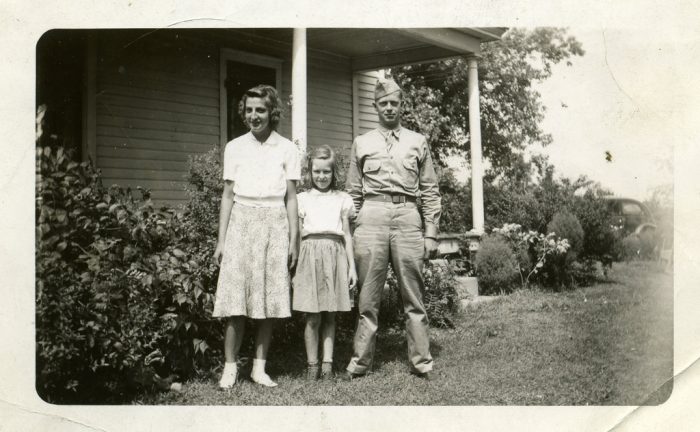Two kind men unloaded a truck full of furniture from my parents’ house last week.
It was a cosmic guffaw at my dream of minimalism.
I feel tenderness, though, toward the stories these sticks and shapes of the past share with me.
The brass kindling box with repoussé Flemish men playing cards is where my grandmother placed a Little Golden Book for me to find when I visited her. The Louis XVI style coffee table with slim black legs and marble insets was bought by Dad for his parents after college as a manifesto of his allegiance to beauty.
But who wants to inherit a recycling bin, built one Saturday with Ikea hex keys?
Can we assess the valuables and the recyclables of our inheritance? What are a physiognomy, a family culture, sticks of furniture? The inheritance that prior generations give to our current society may be chipped, shameful, and bad karma—or trustworthy and valuable.
Buddhist nun and meditation teacher Pema Chödrön has a teaching for assessing feelings and thoughts. I thought it might be helpful as I consider the package of values and hindrances I find in my family story.
She has said gentleness with ourselves is the most important thing.
I only read that statement of hers as I researched this article, but it is true. The gentleness I learned from meditation practice guided me away from self-importance that hummed around the artifacts my parents sent me. This potential for aggression and irony were a form of confusion about how I could contain gratitude for the past and its virtues.
Here are four steps Pema Chödrön offers as a way to gently consider our moments of shenpa (getting hooked or triggered by circumstance):
1. Recognize (the trigger, the hook):
We inherit objects that stir memory and marry our past and present visual landscapes. The hand-painted family china above the mid-century buffet can be a conversation piece. This kind of sentiment hurts no one.
We have other seemingly random caches of stuff to unpack. Because of our race or our mental gifts, we receive biases against or for us. This reality of my unchosen heritage has both beauty and ugliness.
2. Feel (accept reality):
I feel a mix of reverence, sentiment, and sternness toward what my particular American culture has passed on to me. My family culture was white, educated, working-class, religious, and ahead of its time in being supportive of women.
Yet, in 1947, my grandfather went into Anacostia, a tough Washington D.C. neighborhood, to repair a house he rented out. Ten-year-old Dad asked why the toilet seat was only half of one. My grandfather said slowly, “Well, that’s the kind of people they are.” Half-assed. He thought it was funny, and it sort of was.
But, what’s really going on here? Even though my family was progressive on women’s issues like work and education, there seems to have been a blindness when it came to those struggling with poverty. My grandfather had looked down on this family for not finding a suitable solution for the broken toilet seat, but sometimes, you just don’t have the money or the tools to make a repair like that. I picture a family trying hard just to keep a roof over their heads.
3. Release (from the storyline):
I want to look carefully at the stuff that has been unloaded on me. Did my culture teach me that democracy is meant to take up the cries of the downtrodden? Check. Did my culture teach me that people are valuable regardless of their success? Not check.
So, the recycling bin. My subculture had qualities of gentleness and uncomplaining hard work. Subcultures are beautiful places with community that sustain us, bringing levity and friendship. However, each subculture of identity has its musty attitudes. Can we honor without sentiment the great thoughts and actions of those who preceded us, while recycling hatreds, pettiness, and grudges into noble empathy?
Some people will say no. They feel it is a betrayal of their parents, or their culture’s great leaders. It is not a betrayal. Keep the good and let the questionable go. Would any of us want our ugliest statements to be something that future generations stood firm on?
4. Relax (soften):
Pema has said, “Blaming strengthens habitual patterns.” I want to love those who sang and wrote and loved before me. So, the 12 crystal salt dishes will stay. It feels biblical, in a happy sort of way.
~












Read 0 comments and reply